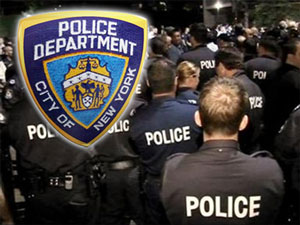Complaints against New York City police rising
By Saeed ShabazzStaff Writer | Last updated: Jul 3, 2009 - 9:22:49 AM
What's your opinion on this article?

Complaints cited in the report ranged from allegations of abuse to questions about officer conduct. |
Complaints cited in the report ranged from allegations of abuse to questions about officer conduct.
The NYCLU said complaints have spiked because “the NYPD isn't disciplining officers found to have abused civilians, and does not seem to be doing anything to help stop the mushrooming number of officers being monitored.”
The report said approximately 315 officers out of 35,000 were now enrolled in the NYPD monitoring program, up from 210 for 2007. The NYCLU also shared a Civilian Complaint Review Board allegation that of 17 substantiated complaints against officers submitted in April, the NYPD dismissed 12 without taking disciplinary action.
A spokesperson for the NYPD legal advocacy office has reportedly said the dismissed cases were not prosecuted because they lacked legal merit.
There is “a big concern that the police department is simply rejecting recommendations by the CCRB for disciplining officers,” said the NYCLU.
Amnesty International, in a position paper entitled a “Racial Profiling Background,” said “law enforcement agencies should hold accountable officers who deny equal protection under the law to individuals by engaging in racial profiling.”
The New York City Council revealed during a January hearing that at a time when there are more complaints than ever, NYPD prosecuted a smaller number of complaints deemed serious by the CCRB than five years ago.
None of the revelations surprise Ron Hampton, of the Washington-based National Black Police Association.
“Of course (it's) not surprising given New York City's history of aggressive policing,” said Mr. Hampton, during a telephone interview with The Final Call. “And historically when the truth comes to light about the civilian complaints concerning the NYPD, they back off, but then it starts all over again. Take for instance after 9-11, it took the NYPD all of 30 days to get back to brutalizing Blacks.”
The NYCLU found that in the first three months of 2009, 52 percent of all people stopped by police for questioning were Black, compared to Whites who constituted nine percent of the stops.
Mr. Hampton insists the stops and police brutality go hand-in-hand and are part of a national problem.
“We just received a report that police brutality and racial profiling are alive and well in the state of West Virginia and in the state of Nebraska. The University of Nebraska in Omaha states in a report sent to our organization that their studies of police stops show a clear example of racial profiling,” he said.
The Obama administration needs to create a national commission and task force and support anti-brutality legislation, because “to end police misconduct you must have the force of law,” he said.
Mr. Hampton urged Congress to pass the Racial Profiling Act of 2007. Doudou Diene, the UN special rapporteur for human rights and racism, who traveled across the U.S. from May to June 2008, also called for passage of the Racial Profiling Act in a report presented to the 47-nation UN Human Rights Council June 16. The House version (HR-3847) is sponsored by Michigan Democrat John Conyers, chairman of the House Judiciary Committee. A companion bill in the Senate (S2481) is sponsored by Russ Feingold (D-Wis.). The bills define racial profiling and ban it at all levels of law enforcement—federal, state and local.
INSIDE STORIES AND REVIEWS
-
-
About Harriett ... and the Negro Hollywood Road Show
By Rabiah Muhammad, Guest Columnist » Full Story -
Skepticism greets Jay-Z, NFL talk of inspiring change
By Bryan 18X Crawford and Richard B. Muhammad The Final Call Newspaper @TheFinalCall » Full Story -
The painful problem of Black girls and suicide
By Charlene Muhammad -National Correspondent- » Full Story -
Exploitation of Innocence - Report: Perceptions, policies hurting Black girls
By Charlene Muhammad -National Correspondent- » Full Story -
Big Ballin: Big ideas fuel a father’s Big Baller Brand and brash business sense
By Bryan Crawford -Contributing Writer- » Full Story






 Click Here Stay Connected!
Click Here Stay Connected!








